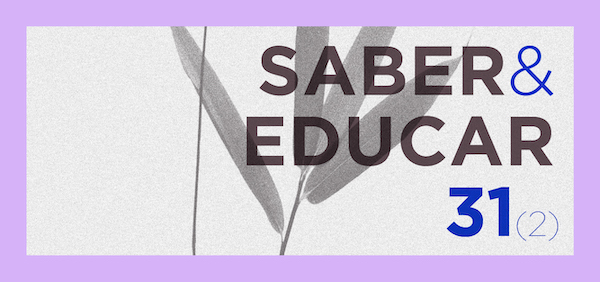And you, what do you think school is?
DOI:
https://doi.org/10.25767/se.v30i2.29380Abstract
The way we think school and, consequently, curriculum, is influenced by different ethical, social and pedagogical positions, by the historical time in which we live, by the political-social-cultural context in which we are inserted, by principles and beliefs that we reveal, the personal experience in school contexts, the dialogues that we develop and the worldview that we build as reflective beings (Author, 2021). However, when we regularly question the existence of the school institution, we are confronted by simple answers such as "to guard children and entertain them" and "to reproduce the established culture" (Coll et al., 2001, p.17). With the purpose of analyzing the perspectives that elementary school children have about what school is and what its purposes are, a case study was developed, taking as reference a Learning Centre. In this work, two data collection techniques were integrated, individual "micro-interviews" and group interviews. First, we discuss, from various perspectives of curriculum and education, what the purposes of the school are, and explore how the curriculum text reveals implications in the curriculum experienced, something that has an implicit dimension in the conception of school that each one builds. From an initial analysis, answers were obtained that privilege the academic nature of the school reality, favouring options such as "study, learn to read and do math". Such a position dialogues with other aspects that are particularly emphasized by the children, such as the dimensions associated with the student's craft, sociability, the built environment and a certain instrumental view of the curriculum.
References
Alarcão, I. (2001). Escola reflexiva e Nova racionalidade. ArtMed Editora.
Aoki, T. T. (2005). Curriculum in a new key: the collected works of Ted T. Aoki. Lawrence Erlbaum Associates.
Boavida, J. & Amado, J. (2008). Ciências da educação Epistemologia, Identidade e Perspetivas, (2ª ed.). Imprensa da Universidade de Coimbra.
Canha, B. (2021). Prefácio. In Em Pensar o desenvolvimento curricular: uma reflexão centrada no ensino. Instituto Politécnico do Porto. Escola Superior de educação.
Coll, C., Martin, E., Mauri, T., Miras, M., Onrubia, J., Solé, I. & Zabala, A. (2001). O Construtivismo na Sala de Aula. ASA Editores.
Costa, J. (2019). Prefácio. In J. Pacheco, Inovar para Mudar a Escola. Porto Editora.
Decreto-Lei nº55/2018 de 6 de julho. (2018). Diário da República n.º 129/2018, Série I de 2018-07-06, páginas 2928 – 2943.
Decreto-Lei nº 54/2018 de 6 de julho. (2018). Diário da República n.º 129/2018, Série I de 2018-07-06, páginas 2918 – 2928.
Duarte, P. (2021). Pensar o desenvolvimento curricular: uma reflexão centrada no ensino. Instituto Politécnico do Porto. Escola Superior de Educação.
Leão, D. M. M. (1999). Paradigmas Contemporâneos de educação: Escola Tradicional e Escola Construtivista. Cadernos de Pesquisa, (107), 187-206.
Lei de Bases do Sistema Educativo n.º 46/86 de 14 de outubro. (1986). Diário da República n.º 237/1986, Série I de 1986-10-14.
Matos Vilar, A. (1994). Currículo e Ensino: para uma prática teórica. Edições ASA.
Moreira, A. I., Duarte, P., Rothes, L., & Diogo, F. (2020). “Eu, quando era pequeno, gostava da escola… de comer na cantina”: perspetiva(s) dos adultos sobre a organização escolar. Educação. https://doi.org/10.5902/1984644439626
Pacheco, J. A. (2019). Inovar para Mudar a Escola. Porto Editora
Silva, I. S., Veloso, A. L., & Keating, J. B. (2014). Focus group: Considerações teóricas e metodológicas. Revista Lusófona de educação, (26), 175-189.
Tadeu da Silva, T. (2010). Documentos de identidade: Uma introdução às teorias do currículo (3ª ed.). Autêntica.
Young, M. (2014). Teoria do currículo: o que é e porque é importante. Cadernos de Pesquisa, 44(151), 190-202.
Downloads
Published
How to Cite
Issue
Section
License

This work is licensed under a Creative Commons Attribution-NonCommercial-NoDerivatives 4.0 International License.
- The opinions expressed by the authors are their exclusive responsibility.
- The journal reserves the right to make the original, normative changes, spelling and grammar, in order to maintain the standard language of worship, while respecting the style of the authors.
- Authors retain copyright and grant the journal right of first publication with the work simultaneously licensed under a Creative Commons Attribution License (BY-NC-SA 4.0) that allows others to share the work with an acknowledgement of the work's authorship and initial publication in this journal.
- Authors are able to enter into separate, additional contractual arrangements for the non-exclusive distribution of the journal's published version of the work (e.g., post it to an institutional repository or publish it in a book), with an acknowledgement of its initial publication in this journal.
- Authors are permitted and encouraged to post their work online (e.g., in institutional repositories or on their website) prior to and during the submission process, as it can lead to productive exchanges, as well as earlier and greater citation of published work (See The Effect of Open Access).
PRIVACY STATEMENT
The names and email addresses entered in this journal site will be used exclusively for the stated purposes of this journal and will not be made available for any other purpose or to any other party.






